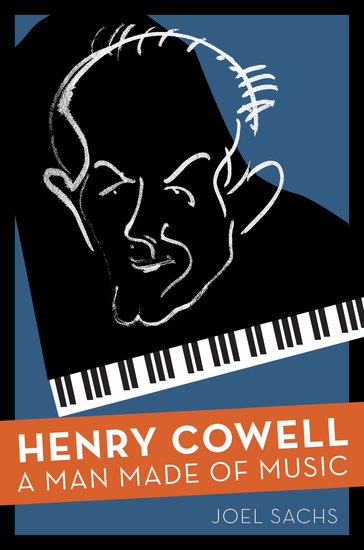By Joel Sachs
As I began to go through papers at the New York Public Library for the Performing Arts, I was buffeted by competing forces: the exhilaration of unravelling the stunning reality of a man’s life, and the growing fear that, should I actually live to read all of the documents, I might never be able to digest them. If I had known from the outset the true size of that archive, how many other sources I would have to consult, how much background information I would need, and how many interviews would be necessary, I would have quit at once. Fortunately, I didn’t know what I faced.
Henry Cowell’s life was so rich in extraordinary adventures and projects, miraculous encounters, and distressing misfortunes, that in a novel such a character would be considered implausible. And there is no shortage of information to bolster his story.
Reading through the Cowell papers — some 180 linear feet of paper — was enlightening, once I resigned myself to giving up so much of my life to it. The staggering cast of characters in the correspondence includes Presidents Roosevelt, Kennedy, and Johnson; Leon Trotsky’s sister; most of the significant composers of the first half of the twentieth century; masses of intellectuals, entrepreneurs, and performers; and perfectly ordinary people. The thousands of letters, however, were only the beginning. There are many hundreds of newspaper reviews and articles in many languages, Cowell’s own voluminous writings, his music, and the miscellany of his life, including unused Paris metro tickets from the 1920s. Furthermore, significant invaluable information turned up in libraries and archives from California to Moscow and in unending books and articles about musical life, urban development, and California law. Then I needed several years of what my son calls “pacing to the refrigerator” before I could begin writing.

Some of the best sources — family, friends, and associates — could only be used with extreme caution. Contrary to long-lived rumors that Mrs. Cowell wanted to whitewash his life, she was so determined that a biography be accurate that she set down, on paper or on tape, an endless stream of memos and recollections. She must have typed continuously for 30 years! I knew her well enough to be convinced that she was incapable of lying. Some extremely negative statements reinforced my faith that she didn’t want to fabricate a false, glowing image of him but simply to make his amazing and selfless life, and his music, known again. It became tempting to take everything at face value, but that would have been a huge mistake. Serious questions arose as to whether her memories were accurate, especially when they were written as much as half a century after the events. Sometimes she would comment that she might be mis-recollecting; at other times she wrote with great assurance, even though she occasionally contradicted an earlier observation or unimpeachable evidence in the Cowell papers. Although I tried to avoid using statements that couldn’t otherwise be verified, many are unique sources for important facets of his life.
Two important sources of Henry Cowell’s own statements suffer from related problems. One of them is his witty, off-the-cuff lecture-recital, “Autobiography of a Composer,” which he delivered to great acclaim for more than 30 years, winning universal plaudits because of the nature of his career and his deadpan humor. Unfortunately, the only written version of it stems from the end of his life, when he had had several strokes. It is very difficult to determine whether some of the events that he described happened as recalled, or whether he had unconsciously been elaborating them over the years. (Sidney said that he never lied, but liked a good yarn.) The same is true of his 1962 interviews for the Columbia Oral History project, including priceless stories of his tennis games with Schoenberg. Although Nuria Schoenberg Nono told me that the general outline is doubtless true, the amusing details are unverifiable. In the end, although some stories were irresistible, I had to omit others, and always cautioned that some salt might be necessary. Even if those recollections were only “good yarns,” they illuminate his lovable personality.
How much easier it would have been if Henry Cowell had had fewer adventures, fewer accomplishments, and if all the information were clearly correct. And what a more monochrome tale it would have made.
Joel Sachs is Professor of Music History, Chamber Music, and New Music Performance at The Juilliard School, where he conducts the New Juilliard Ensemble. He is the author of Henry Cowell: A Man Made of Music.
Subscribe to the OUPblog via email or RSS.
Subscribe to only music articles on the OUPblog via email or RSS.
View more about this book on the ![]()
![]()




Recent Comments
There are currently no comments.